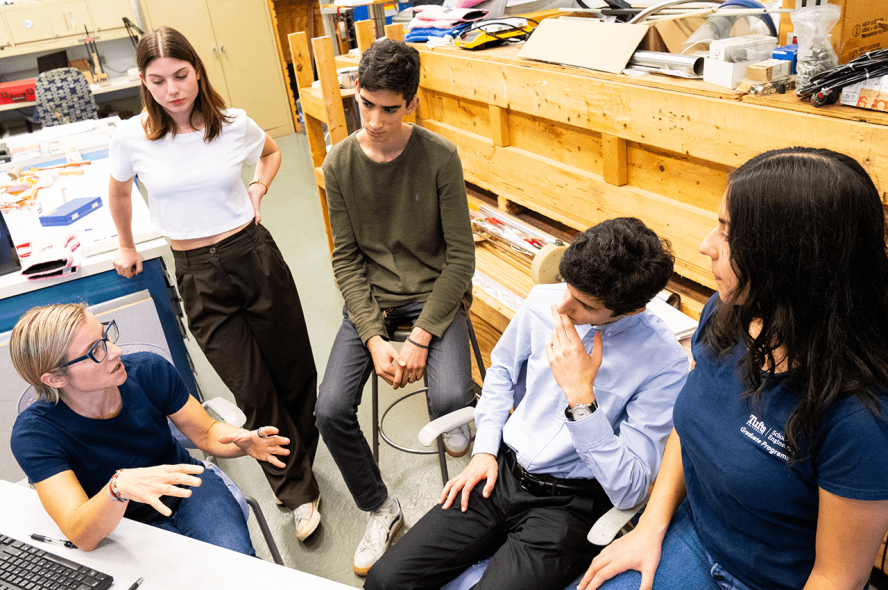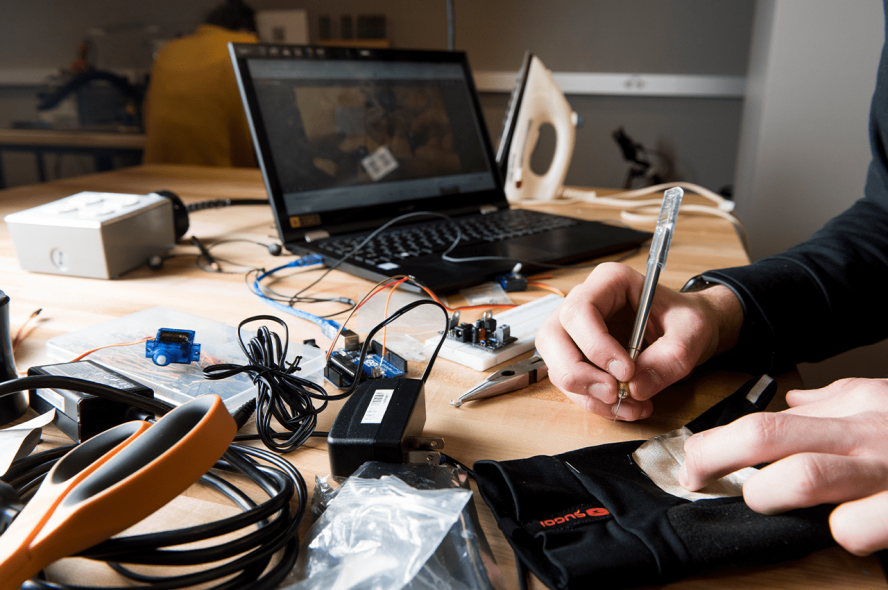Getting Started in Research

The Department of Mechanical Engineering encourages undergraduate and graduate students to pursue research opportunities. From soft-bodied robots to superconducting materials to cell swimming at the micro-scale, our faculty lead a variety of innovative research efforts and provide hands-on learning experiences.
Everyone is encouraged to do research. There are many options for getting involved: you can be paid hourly, by semester, over the summer or get credit.
The information below provides important first steps, answers frequently asked questions, and identifies opportunities for undergraduate and master’s students.
First Steps
Consider applying if you’re curious about a concept and willing to learn and commit time and energy to exploring ideas; even with no experience. Before applying to a lab, explore the different types of projects happening in the Department of Mechanical Engineering. It is helpful to discuss your interests with peers, graduate students, teaching assistants, and faculty. Talking about your interests will help you to refine your ideas, and your peers may be able to connect you with relevant projects and labs.
Research Paths
| Who am I? | One semester Project* | Multi-semester thesis* |
| Undergraduate | ME 94 | ME 96 |
| Master's Student | ME 294 | ME/ENP 296 |
*If you would like to pursue research without credit, please inquire with your prospective faculty mentor. Opportunities for payment depend on faculty and their available funding.
Take a moment to review the frequently asked questions and lab profiles listed below. These labs may have openings available for undergraduate and master’s students. Each profile includes a research overview, information about prerequisites and deadlines, and a link to the lab’s website. On each website, you’ll find information about current projects, recent publications, contact information, and more.
Frequently Asked Questions
-
Research positions are best suited for curious students who are interested in diving deeper into the world of mechanical engineering or human factors research. For students intending to pursue graduate school, or research careers in engineering or related fields, research experiences are highly encouraged.
Independent research is for students who want credit for the research and must fill out the respective forms linked in the table above.
-
Research requires commitment, creativity, passion, and dedication. Research research can be extremely rewarding, but also time-consuming. If you are looking to do independent research (receive credit), research mentors will expect that students commit approximately 10 hours per week of research, typically over multiple semesters. It should not be pursued solely to pad a resume or CV. You will need to carefully consider your own priorities and other commitments before deciding to pursue independent research.
-
The department holds weekly seminars in which visiting faculty, typically from other institutions, present their current research. Undergraduates are encouraged to check out the seminar schedule and ME291 - Graduate Seminar to attend talks that interest them. Finally, interested undergraduates are encouraged to look at the research lab websites linked above to learn more about their research and read some of their recent publications.
-
Yes! Faculty are interested in learning more about your research interests and may be able to direct you to other opportunities, provide you with updated information on when a position would be available, or if there are other ways to get involved.
-
Research will only appear on your transcript if you take it for credit, fill out the necessary forms and enroll in the class.
- Undergraduates can take one semester of ME 94 (Research). To do a second semester of research they must take a thesis.
- For graduate students, the rules are a bit more complex (and may be degree dependent), but at least for the MS in ME, students can take up to 3 semesters of research credits as a combination of ME 294 and ME 296.
Note: Research advisor consent required for all of these undergraduate and graduate options.
-
- If you anticipate conducting research for credit and have identified a faculty member to serve as your advisor, you must get department permission. Fill out the appropriate form (proposal for undergraduate research form, independent study form for graduate students, or the human factors engineering graduate student form) and then give to the ME office. Once approved, you will be given permission to enroll in your respective course.
- If you are applying directly for a paid research position during the summer/academic year, please consult directly with the steps outlined in “Get Involved” under each lab/research's group profile.
Research Lab Profiles
Applications of Data Science in Human Factors Engineering
A focus on quantitative approaches to understanding participant functioning on complex human-machine systems. This includes developing neural network models in cognitive neuroscience and aging, modeling human-machine teaming, and developing compensatory mechanisms to alleviate age-related losses in vision and cognition.
Automated Systems and Robotics (ASAR) Lab
The goal of the Automated Systems and Robotics Laboratory is to develop novel control, navigation and interface technologies that ensure safe, reliable and seamless interactions between human and machine.
Chiesa Research Group
The Chiesa Research Group’s primary research area is superconducting materials for energy application, including electro-mechanical behavior of superconducting materials for large magnets used in fusion power devices.
Computational Mechanics Lab
The Computational Mechanics Lab develops mathematical and computational tools to study multiscale fluid–structure interactions in complex biological, biomedical, and engineered systems.
Dave Miller - Human Factors
Assistant Teaching Professor Dave Miller studies driving simulation, usability research, and human-computer interaction.
FETLab@CEEO
The Future Educational Technologies (FET) Lab leverages the learning sciences to develop new educational technologies for K-16 science, math, and engineering education.
IDEAlab
Innovation, Design, Engineering, Action! The IDEA Lab is an adventurous research group involved in projects related to virtual reality development, machine learning, UX/UI design, human factors, industrial design, hyper-spectral imaging, and so much more.
Sensors and Systems Lab
The Sensors and Systems Lab explores sensing systems and automation using Micro- and Nano-Electromechanical Systems (MEMS/NEMS) sensors, ultrasound and acoustics, and other sensing modalities. We use microfabrication processes and materials, signal processing and electronics, and perform physics-based computational modeling to build mixed electro-mechanical sensing systems and hardware, perform experiments in wind tunnels and water tanks, and deploy sensing systems to the field.
Nemitz Robotics Group
The Nemitz Robotics Group develops resilient robotic systems capable of withstanding structural deformations and electromagnetic interference that would disable conventional computing and control methods.

Summer Research
Undergraduate students have the opportunity to apply for scholarships to fund summer research. Summer programs include:
Have more questions?
Please stop by the ME office (Robinson 150) or email meinfo@tufts.edu.